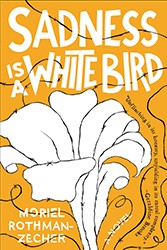High school senior Ariel Stone, the central character in Laura Silverman’s new novel about highly pressured overachieving teens, is always reading Crime and Punishment. The Russian door stopper of a book is either on his phone while he pretends to pray during Shabbat services, or in audiobook format as he quickly moves from one class or extracurricular activity to another. Ariel’s constant proximity to Dostoevsky’s morally intense classic, assigned reading for his A.P. English class, is the perfect symbol of his endless quest for perfection. There is no down time for Ariel; all of his time is dedicated to the manic pursuit of excellence, and ultimately, to an offer of admission by Harvard. Silverman’s central character is Jewish and bisexual; she explores both of these aspects of his life with sensitivity and realism. Yet in the end, Ariel is Everyman or Everyteen, trying to attain a goal whose very meaning has become nearly meaningless.
Ariel is a character young adult readers will recognize and embrace. The novel is full of details which bring him to life, from its painstaking catalogue of A.P. courses and their relative difficulty, to its descriptions of his loving father and mother, a dedicated civil rights lawyer and a muckraking journalist. In a poignant irony of parenting, they are completely accepting of his sexual orientation, yet at the same time, unaware of their son’s anguish every time they mention that he is applying to Harvard. The cast of the novel is multicultural, from Ariel’s Korean-American best friend, a lesbian musician, to his love interest, Amir, the son of a Pakistani-American family as close as Ariel’s own. There are many details which touch upon the complexity of religious and ethnic identities. The Stone family’s Judaism cannot be easily categorized. Like many American Jews, they pick and choose from their tradition, finding their own way without a suggestion of hypocrisy. Ariel’s family almost always spends Friday evening together, blessing the candles and wine, and bonding over matzo ball soup. (The author’s constant references to the soup’s excellence and its universal approval by Ariel’s non-Jewish friends seems a bit too persistent.) Later, Ariel and his friends might enjoy a second meal at a Thai restaurant. A subtle reference to the fact that Amir’s sister, Rasha, wears a hijab, although their mother does not, also grounds the novel in changing religious practices across cultures.
Silverman builds tension with subtlety and narrative expertise. Readers begin by wondering if Ariel will indeed maintain his status as valedictorian, but gradually become aware, along with Ariel himself, that his psyche is fracturing and may not survive. The authors win over readers who might be skeptical that this hyper-accomplished son of affluent parents merits so much empathy. Ariel shows solicitude for his equally pressured younger sister, is aware that he has let down his friends, and is open to help from Rabbi Solomon, a perceptive and kind woman who offers him Talmudic wisdom and mandelbread when he is about to faint on Yom Kippur. Ariel is a growing mentsch caught in a trap where “…good grades will get me into a good school. And a good school will get me a good job. And a good job will get me a good life.” Young adult readers will become absorbed in Ariel’s quest for perfection and in his gradual awakening to a confusing and decidedly imperfect sense of self-worth.
The author includes a recipe for matzo ball soup at the end of the book. Highly recommended.
Emily Schneider writes about literature, feminism, and culture for Tablet, The Forward, The Horn Book, and other publications, and writes about children’s books on her blog. She has a Ph.D. in Romance Languages and Literatures.





